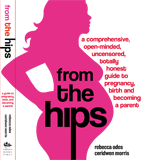Bad Study Habits
Two big bombs were dropped this week, shattering parenting paradigms from coast to coast. First Penelope Leach announced the results of her massive study on maternal versus non-maternal child care. Result? Kids who spend a large amount of time away from their mothers "tended to show higher levels of aggression or were inclined to become more withdrawn, compliant and unhappy." The second hit came courtesy of the AAP who, as a consequence of recent studies, have come out against co-sleeping and in favor of the pacifier.
The studies may be true to a point. And they may have valid things to say about these issues. But there's a larger question at stake here. How do we proceed as rational, informed parents with so much official and contradictory advice a Google search away?
When we read the Penelope Leach report, our hearts raced as we envisioned a future of after-school detention and delinquency court for our children. But then we wondered about those other "studies," the ones that informed us that the kids of working moms are more confident. What happened to that particular positive outcome of non-maternal care? Or is Leach's adjective "aggressive" the flipside of confidence? Our confusion deepens. Meanwhile, does anyone study the older children of working parents? Or the home enviornments? Or the circumstances of the childcare? Or kids' DNA? Maybe they do, and studies are out there, intersecting with each other, colliding, canceling each other out. Has anyone proven that a three-year-old who aggressively grabs a toy truck grows up to be a mean boss or a date rapist? Of course not. There are too many variables. So we search onwards, for more answers, from more studies.
Our first thought after reading the AAP announcement was how the recommendation for pacifier use contradicted their recently restated breast-feeding endorsement. We also wondered if all the benefits of co-sleeping (for both the tired breastfeeding mom and breathing rhythms of the baby) are now disqualified. What about co-sleeping under optimal conditions? What are the studies the AAP used to come to their conclusions? What were the parameters? As Sara Gilbert points out in her excellent rant against the AAP recommendations: "I just have a problem with the science behind these recommendations. It’s so murky, so imprecise, so much guesswork."
And so we Google some more. How do we resist the TYRANNY of the STUDIES while still reaping their benefits?
Maybe we just have to train ourselves to read them critically. To figure out what makes sense in the context of what we've been doing, what has been working and what hasn't. Your hunch may be just as reliable as the latest news from headquarters. If you feel like your mattress is firm and your family is sleeping, use that information to make a judgment. And your own powers of observation can tell you whether your caregiver is doing a good job. Besides, unless Ms. Leach is going to share her royalties with you so you can stay at home and cultivate your child's gentler side, you might not have much choice in the matter. Where you do have choice is in how to handle this endless influx of studies. We all want to be informed parents, but we can't spend our time panicking, running from one corner of the room to the other. No. When considering these studies we need to assess ourselves, our children, our lives as they exist on the ground. Then we can take what we need and scrap the rest. Besides, whatever you do, sooner or later a study will denounce it, followed by another one that says you were right all along.
in baby













